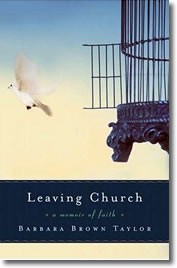Leaving Church
 I was reading Barbara Brown Taylor’s Leaving Church at church the other day as I waited for my children to finish an activity, and a friend asked me what I was reading. “Uh-oh,” she exclaimed when I showed her the book.
I was reading Barbara Brown Taylor’s Leaving Church at church the other day as I waited for my children to finish an activity, and a friend asked me what I was reading. “Uh-oh,” she exclaimed when I showed her the book.
“I have my moments, but I’m not there yet,” I reassured her with a smile.
It’s not a book about leaving the faith, but rather about leaving the clergy. As its subtitle says, it’s “a memoir of faith.” This is my second read by Taylor; the first was An Altar in the World. I find Taylor’s journey through Christianity to be both winsomely told and interesting, and she provides a clear-eyed, thought-provoking look at the church.
This book begins after Taylor has been ordained and has practiced parish ministry in an Atlanta Episcopal church for several years, and she realizes that she is exhausted. The demands of a large city church, coupled with her own perfectionistic nature and approach to her priestly office, are wearing her out, and she ends up moving to a smaller church in a north Georgia town for a few years before resigning her post altogether. Having carried with her the same internal structures and motivations from one church to the other, she burns out in the same way.
Once outside her role as priest, her journey continues (ultimately she ends up a college professor), and to me this was the most interesting part of the book because of her skill in writing about the insights she gains. To move from her position of clerical authority is to discover a whole new perspective on the church and the faith. At one level this is a story about the disentanglement of faith from the institutional church, and the ways the hierarchy and institutional dynamics have compromised the church’s ability to embody what it preaches. Taylor writes with compassion and honesty about the way churches seem so tightly organized around the personalities of their pastors, yet the pastors feel less powerful than bewildered by the resistance they sometimes encounter. She writes of the interpersonal dynamics that make some people much more comfortable arguing about Scripture than loving one another, and how her understanding of doctrine is inextricably intertwined with human relationships. And she addresses some of the contradictions between what a church professes to be, and what it actually is:
All these years later, the way many of us are doing church is broken and we know it, even if we do not know what to do about it. We proclaim the priesthood of all believers while we continue living with hierarchical clergy, liturgy, and architecture. We follow a Lord who challenged the religious and political institutions of his time while we fund and defend our own. We speak and sing of divine transformation while we do everything in our power to maintain our equilibrium. If redeeming things continue to happen to us in spite of these deep contradictions in our life together, then I think that is because God is faithful even when we are not.
There is more to this book than I feel I can summarize well, but I found her journey fascinating. Her writing is seasoned with wisdom and humor (it reminds me a little of Anne Lamott, but with a gentler irreverence), and she is able to write with a surgeon’s delicacy and precision about subtle things. In general she takes a more liberal view on some issues than I’m used to, but I found this a breath of fresh air and a welcome challenge to think.
I especially liked her idea of spiritual geography. The church is at the center of the map, preserving the traditions, defending the structures, enforcing authority, while there is another kind of spiritual life going on at the edges:
According to the Bible, both the center and the edge are essential to the spiritual landscape, although they are as different from one another as they can be. The wilderness of Sinai provided the people of Israel with an experience of God that was distinct from their experience in the Temple in Jerusalem. The Judean desert showed Jesus a side of God’s Holy Spirit that was not apparent while magi knelt before his manger in Bethlehem. There is life in both places because the same God is in both places, but they are so different from one another that it is often difficult for people to be one place without wanting to be the other place or to agree that both places really belong on the same map. Much that is certain in the center is up for grabs in the wilderness, while much that is real in the wilderness turns out to be far to feral for the center.
Leaving Church speaks from the perspective of an intelligent, deeply committed woman who has discovered the deficiencies in her own practice of faith, and in the church’s manifestations, only after wholehearted engagement. It takes a long, rich view of the church, and carries the authenticity of someone who has been deeply involved in it for years. In this respect I found Leaving Church to be a much more satisfying book than unChristian, another recent read that examines some of the shortcomings of evangelicalism, but from a perspective I found to be somewhat commodity-driven, focused on the way faith is “packaged” or “marketed” to appeal to a generation.
Leaving Church eased my sense of invisibility, and I appreciated Taylor’s depth and honesty. As always after reading a book that speaks to you at a deep level, the challenge is to figure out how to live constructively with it in your own world. Good books shouldn’t just be put back on the shelf as room decor, but it can be difficult to know how to make them part of one’s mental and spiritual outlook. Yet any book that makes you feel you’ve met a kindred spirit is worth a little destabilization. Leaving Church offers much to ponder about life and faith, nature, feminism, calling and the church, and I recommend it.



2 Comments
DebD
It sounds quite interesting. I may have to look around for this book.
Your last paragraph resonated with me. However, lately I’ve found it very hard to put into words why I may have loved a particular book.
Janet
Yes, me too.
Taylor might make you mad at times, but not in a “throw the book across the room” way. :-) I’d love to know your thoughts if you do read this.